北师大初二英语上册重点语法
初二英语上册(北师大版)Unit 6 Celebrations 知识点总结
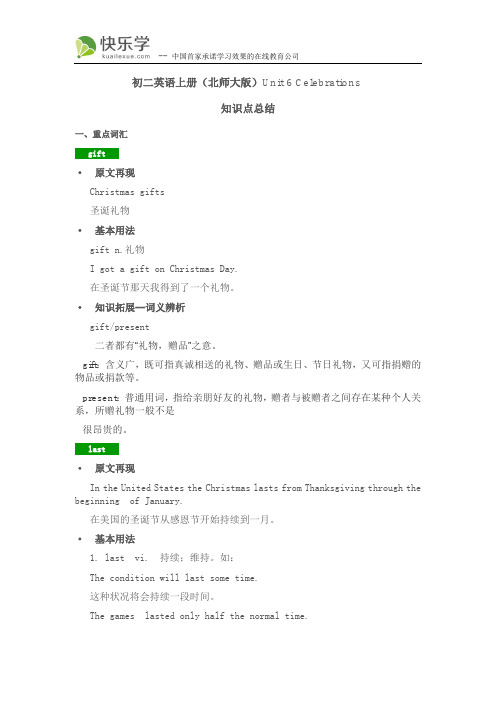
初二英语上册(北师大版)Unit 6 Celebrations知识点总结一、重点词汇gift·原文再现Christmas gifts圣诞礼物·基本用法gift n.礼物I got a gift on Christmas Day.在圣诞节那天我得到了一个礼物。
·知识拓展--词义辨析gift/present二者都有“礼物,赠品”之意。
gift:含义广,既可指真诚相送的礼物、赠品或生日、节日礼物,又可指捐赠的物品或捐款等。
present:普通用词,指给亲朋好友的礼物,赠者与被赠者之间存在某种个人关系,所赠礼物一般不是很昂贵的。
last·原文再现In the United States the Christmas lasts from Thanksgiving through the beginning of January.在美国的圣诞节从感恩节开始持续到一月。
·基本用法1. last vi. 持续;维持。
如:The condition will last some time.这种状况将会持续一段时间。
The games lasted only half the normal time.比赛只持续了通常时间的一半。
2. last adj. 最后的。
如:I am the last one to come here.我是最后一个来这的。
celebrate·原文再现Christmas celebrates the birth of Jesus Christ.圣诞节是庆祝耶稣基督的诞生。
·基本用法celebrate v.庆祝,歌颂,赞扬(过去式:celebrated 过去分词:celebrated 现在分词:celebrating 第三人称单数:celebrates)Tom celebrated his 24th birthday two days ago.汤姆两天前庆祝了他的24岁生日。
北师大版八年级上册英语 Unit 1 词汇与语法基础(解析版) (2)
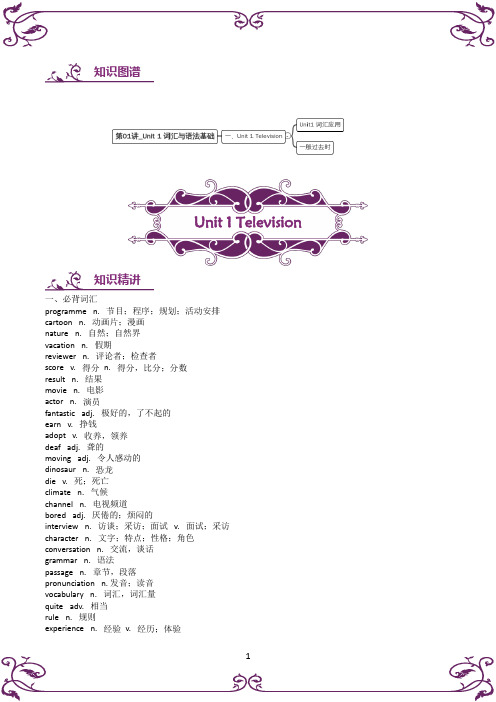
If the service was so bad why didn’t you complain to the manager?
如果服务质量这么差的话,你为什么不向经理投诉呢?
6. form verb & noun /fɔːm/
1). v. to begin to exist or to make something begin to exist
这个电视采访节目将向全国各地播放。
3). v. to ask someone questions in an interview
采访;对…进行面试;讯问
例句:
We’ve had 200 applicants for the job, but we only plan to interview about 20 of them.
(使)出现,(使)形成,(使)产生
例句:
A crowd formed around the accident.
事故现场围起了一群人。
A solution began to form in her mind.
她想到了一个解决办法。
2). n. a paper or set of papers printed with spaces in which answers to questions can be written or information can be recorded in an organized wa解。
The teacher explained the rules to the children.
老师向孩子们说明规则。
8. break verb /breɪk/
1). to (cause something to) separate suddenly or violently into two or more pieces, or to (cause something to) stop working by being damaged
【教育资料】北师大版初二(上)英语第2讲:unit 1语法篇(学生版)学习专用
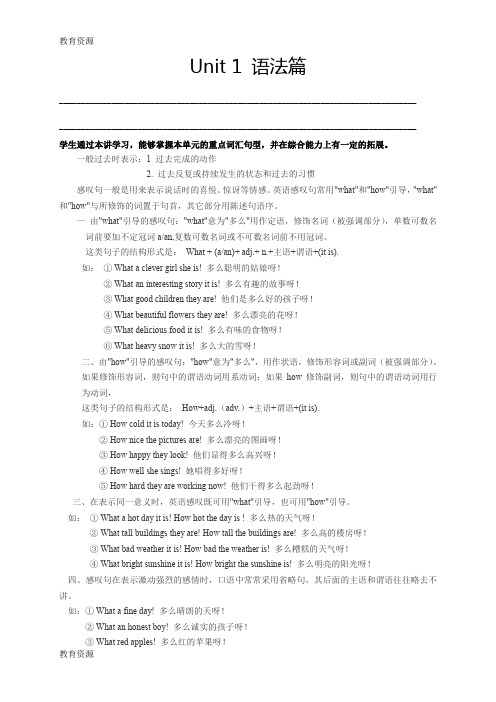
Unit 1 语法篇____________________________________________________________________________________________________________________________________________________________________学生通过本讲学习,能够掌握本单元的重点词汇句型,并在综合能力上有一定的拓展。
一般过去时表示:1 过去完成的动作2. 过去反复或持续发生的状态和过去的习惯感叹句一般是用来表示说话时的喜悦、惊讶等情感。
英语感叹句常用"what"和"how"引导,"what"和"how"与所修饰的词置于句首,其它部分用陈述句语序。
一由"what"引导的感叹句:"what"意为"多么"用作定语,修饰名词(被强调部分),单数可数名词前要加不定冠词a/an,复数可数名词或不可数名词前不用冠词。
这类句子的结构形式是:What + (a/an)+ adj.+ n.+主语+谓语+(it is).如:① What a clever girl she is! 多么聪明的姑娘呀!② What an interesting story it is! 多么有趣的故事呀!③ What good children they are! 他们是多么好的孩子呀!④ What beautiful flowers they are! 多么漂亮的花呀!⑤ What delicious food it is! 多么有味的食物呀!⑥ What heavy snow it is! 多么大的雪呀!二、由"how"引导的感叹句:"how"意为"多么",用作状语,修饰形容词或副词(被强调部分)。
北师大版八年级英语上册 Unit 3 笔记
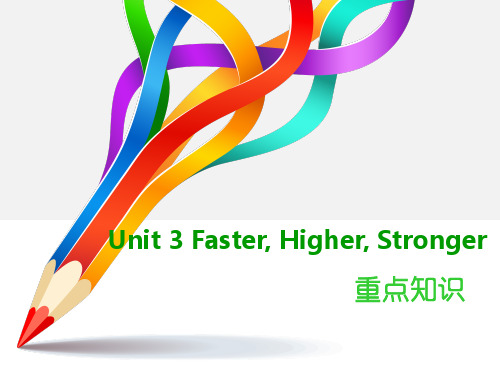
爸爸两年前戒烟了。
三、知识梳理
5. at the age of 在...岁时 He could paly the violin at the age of five. 他五岁时就能拉小提琴。 6. have an accident 发生事故 He had an accident on his way home. 他回家的途中发生了事故。 7. half 用作形容词,意为“一半的,半数的”。half 可以与 a/an 连用,也可以构成“half + the + 名词”或“half + one's + 名词”的搭配。 half an hour 半小时 Half the students are girls 半数的学生为女孩子。 He lost half his left leg and half his right arm.
三、知识梳理
1. It's time for sth. 到...时间了 It's time for after-class activities.
到课下活动的时候了。
2. any other+单数名词 I was faster than any other student.
3. a bit 程度副词,副词可以修饰动词、形容词、副词。
一、重点短语 二笔记
一、重点短语
1、do the high jump 跳高 2、do the long jump 跳远 3、do push-ups 做俯卧撑 4、do sit-ups 做仰卧起坐 5、do pull-ups 做引起向上 6、climb a rope 爬绳 7、after-class activities 课下活动 8、break the record 打破记录 9、a bit 稍微;有点儿 10、joke around 开玩笑
北师大版八年级上册英语 Unit 4 词汇和语法基础(解析版) (1)

matter n.问题;事情
temperature n.体温;温度,气温
deep adj.深(呼吸)的;深的
breath n.一次呼吸的空气
flu n.流行感冒
serious adj.严重的;严肃的
twice adv.两次,两遍
note n.(病假)证明;笔记
patient n.病人
1). to take and keep something in your hand or arms握住,抓住
例句:
The little girl held her mother’s hand.
这个小女孩抓着妈妈的手。
He held her in his arms.
他把她抱在怀里。
2). to support something支撑,承受
less adj.较少的,更少的
letter n.字母;信函
blank n.空白处adj.空白的
二、重点词汇
1. advice noun /ədˈvaɪs/
an opinion that someone offers you about what you should do or how you should act in a particular situation意见;忠告;劝告
例句:
One bag won’t hold all of the shopping - we’d better take two.
买的这些东西一个袋子装不下——我们最好拿两个。
Computers can hold huge amounts of information.
现代的计算机能存储海量的信息。
例句:
北师大版英语八年级上册一单元语法及所需掌握短语

北师大版英语八年级上册一单元语法及所需掌握短语Unit 1 FREE TIME现在进行时,现在进行时表示将来的用法, 一般过去时,表示频率的副词,like+名词/动名词的用法,打电话的习惯用语,兴趣爱好语法:一、现在进行时1. 现在进行时的基本用法:a. 表示现在(指说话人说话时)正在发生的事情。
例如:We are waiting for you. 我们正在等你。
b. 习惯进行:表示长期的或重复性的动作,说话时动作未必正在进行。
例如:Mr. Green is writing another novel. 他在写另一部小说。
(说话时并未在写,只处于写作的状态。
)c. 表示渐变,这样的动词有:get, grow, become, turn, run, go, begin等。
例如:The leaves are turning red. 叶子在变红。
It's getting warmer and warmer. 天越来越热了。
d. 与always, forever 等词连用,表示反复发生的动作或持续存在的状态,往往带有说话人的主观色彩。
例如:You are always changing your mind. 你老是改变主意。
2. 现在进行时表示将来的用法下列动词come, go, arrive, leave, start, begin, return等表示位置移动的动词现在进行时可以表示将来。
例如:I'm leaving tomorrow. 明天我要走了。
Are you staying here till next week? 你会在这儿呆到下周吗?二、一般过去时1. 通常表示过去发生的而现在已经结束的事件、动作或情况。
Eg. Sam phoned a moment ago.I got up at eight this morning.2. 还可以表示刚刚发生的事情而没说明时间。
Eg. Did the telephone ring?Who left the door open?3. 也可以表示过去的习惯性动作。
北师大版八年级上册英语 Unit 6 词汇和语法基础(解析版)
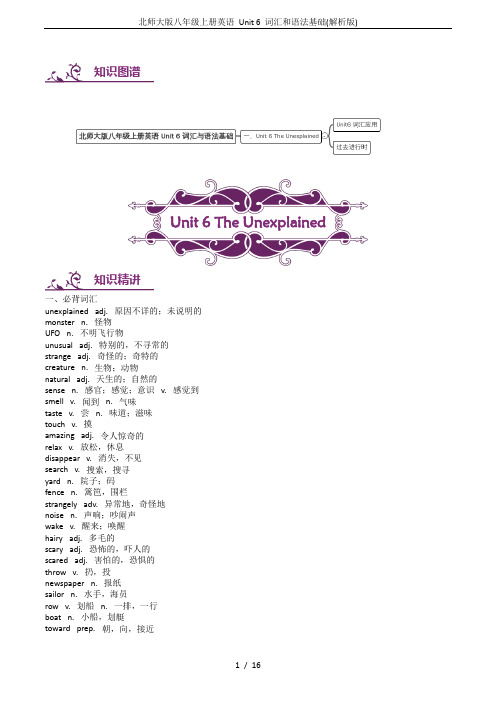
The sun disappeared behind a cloud.
太阳躲到了云彩的后面。
3. search verb /sɜːtʃ/
1). to look somewhere carefully in order to find something
搜查;搜索
例句:
The police searched the woods for the missing boy.
警察在树林中搜寻失踪的孩子。
He searched (in/through) his pockets for some change.
他翻遍口袋想找些零钱。
2). to look for information on a computer, the internet, etc.
1). as found in nature and not involving anything made or done by people
天然的,非人为的;非人造的
例句:
He died from natural causes (= because he was old or ill).
他是自然死亡。
pyjama n.睡衣裤
二、重点词汇
1. unexplained adjective /ʌnɪkˈspleɪnd/
Unexplained events, behaviour, etc. are ones for which people do not know or understand the reason.
wake v.醒来;唤醒
hairy adj.多毛的
scary adj.恐怖的,吓人的
八年级英语上册 unit 2《making plans》语法讲解 北师大版

Unit2 Making Plans语法一、be going to的表达方法。
(一)复习用现在进行时表示未来发生的事情e.g. 1. —Are you free on Sunday?—No, I’m visiting my friends.2. —What is he doing tomorrow?—He is playing baseball tomorrow.3. They’re having a party on Sunday.(二)be going to的表达方法be going to+动词原形1. 表示说话人根据现在已有的迹象,判断将要或即将发生某种情况。
这类句子的主语可以是人,也可是物。
例如:There is going to be a football match in our school tomorrow afternoon. 明天下午我们学校将有一场足球赛。
(已有告示)I feel terrible . I think I’m going to die. 我感到难受极了,我想我快不行了。
Look at t hose black clouds ! It’s going to rain. 看看那些乌云!天快要下雨了。
2. 表示主语现在的意图或现已作出的决定,即打算在最近或将来进行某事。
这种意图或决定往往是事先经过考虑的。
例如:He isn’t going to see his elder brother tomorrow. 他明天不准备去看他哥哥。
Mary is going to be a teacher when she grows up. 玛丽决定长大了当一名教师。
3. 只是单纯地预测未来的事,此时可与will互换。
例如:I think it is going to/will rain this evening. 我认为今晚要下雨。
注意:(1)be going to和will在含义和用法上略有不同。
- 1、下载文档前请自行甄别文档内容的完整性,平台不提供额外的编辑、内容补充、找答案等附加服务。
- 2、"仅部分预览"的文档,不可在线预览部分如存在完整性等问题,可反馈申请退款(可完整预览的文档不适用该条件!)。
- 3、如文档侵犯您的权益,请联系客服反馈,我们会尽快为您处理(人工客服工作时间:9:00-18:30)。
北师大初二英语上册重点语法Company Document number:WTUT-WT88Y-W8BBGB-BWYTT-19998北师大初二英语上册重点语法(一)一般将来时一般将来时表示将来某个时间要发生的动作或者存在的状态。
通常与表示将来的时间状语连用,如tomorrow, the day after tomorrow, next year, next month, next week, in 100 years等。
be going to do (动词原形)结构:表示打算、准备做的事情或者肯定要发生的事情。
如:It is going to rain.will do 结构表示将来的用法:1. 表示预见Do you think it will rainYou will feel better after a good rest.2. 表示意图I will borrow a book from our school library tomorrow.What will she do tomorrow基本构成如下:一般疑问句构成:(1)will+主语+do… Will Sarah come to visit me next Sunday(2)there be 结构的一般疑问句:Will there + be …Will there be fewer trees Yes, there will. / No, there won’t否定句构成:will + not (won’t)+doSarah won’t come to visit me next Sunday.特殊疑问句构成:特殊疑问词+will+主语+…What will Sarah do next Sunday★★练一练★★根据例句,用will改写下列各句例:I don’t feel well today. (be better tomorrow)I’ll be better tomorrow.1. Gina has six classes today. (have a lot of homework tonight)_____________________________2. I’m tired now. (sleep later)_____________________________3. My parents need a new car. (buy one soon)_____________________________4. We can’t leave right now. (leave a little later)_____________________________5. The weather is awful today. (be better tomorrow)_____________________________(二)should的用法:should用来提出建议和忠告,后边加动词原形,否定句直接在should后边加not.例如:I think you should eat less junk food.我认为你应该少吃垃圾食品。
She drives a lot and she seldom walks. So I think she should walk a lot.她经常开车,很少走路。
所以我认为她应该多走路。
Students shouldn’t spend too much time playing computer games.学生们不应当花太多的时间玩计算机游戏。
学习向别人提建议的几种句式:(1)I think you should…(2)Well, you could…(3)Maybe you should …(4)Why don’t you…(5)What about doing sth.(6)You’d be tter do sth.★★练一练★★用should或shouldn’t填空1. I can’t sleep the night before exams.You ______ take a warm shower before you go to bed.2. Good friends ______ argue each other.3. There is little milk in the glass. We _______ buy some.4. They didn’t invite you Maybe you ______ be friendlier.5. I am a little bit overweight. So I think I _______ do exercises every day. (三)过去进行时过去进行时表示过去某一点时间正在进行的动作或者过去某一段时间内一直进行的动作。
1. 构成was /were + doing,例如:I was watching TV at 9 o’clock last night.at 9 o’clock last night是时间点They were playing football all afternoon.all afternoon是时间段2. 过去进行时的标志词at 8 o’clock last night, this time yesterday等。
例如:I was having lunch at home this time yesterday.昨天的这个时候我正在吃午饭。
At that time she was writing a book.那阵子她在写一本书。
(表示她在那段时间里一直在做那件事情。
)★★练一练★★用括号中所给动词的适当形式填空。
1. This time yesterday I ____ ______(read)books.2. At 9 o’clock last Sunday they ______ ______(have)a party.3. When I _____(come)into the classroom, she ________ ______(read)a storybook.4. She _____ ______(play)computer games while her mother ____ ______(cook)yesterday afternoon.5. I _____ ______(have)a shower when you _______(call)me yesterday.(四)间接引语形成步骤:(1)不要逗号,冒号,引号(2)要考虑到人称的变化(人称的变化与汉语是一致的)(3)要考虑时态的变化(4)要考虑时间状语、地点状语和语示代词的变化。
1. 直接引语变成间接引语时,几个主要时态的变化规律直接引语间接引语一般现在时一般过去时一般将来时过去将来时现在进行时过去进行时2. 直接引语变成间接引语时,一些词汇的变化规律直接引语1. am / is2. are3. have / has4. will5. can6. may间接引语1. was2. were3. had4. would5. could6. might★★练一练★★用括号中所给动词的适当形式填空。
1. She said I _____(be)hard-working.2. Peter told me he _____(be)bored yesterday.3. She said she _____(go)swimming last Sunday.4. Bobby said he _____(may)call me later.5. Antonio told me he _____(read)a book then.请转述他人说的话:1. I go to the beach every Saturday. (Tom)2. I can speak three languages. (Lucy)3. I will call you tomorrow. (Mike)4. I’m having a surprise party for Lana. (she)(五)if引导的条件状语从句结构:if+一般现在时,主语+将来时含义:如果……,将要……例如:If you ask him, he will help you.如果你请求他,他会帮助你。
If needed, we’ll work all night.如果需要,我们就干个通宵。
★★练一练★★根据中文提示,完成句子。
1. 如果你参加聚会,你将会过得很开心。
If you ________ the party, you __________.2. 如果明天下雨,我们将不去野餐。
If it __________ tomorrow, we ___________.3. 如果你经常听英文歌,你将会喜欢英语的。
If you often ________, you _________________.请根据内容从所给的15个单词中选出最恰当的10个填入空白处,使短文完整,有些词要根据需要作适当的词形变化。
than, so, tell, us, them, report, beause, love, composition, understand, to, that, much, for, whatA generation gap (代沟)has become a serious problem. I read a_______(1)about it in the newspaper. Some children have killed _______(2)after quarrels (争吵)with parents. I think this is _______(3)they don’t have a good talk with each other. Parents now spend _______(4)time in the office. _______(5)they don’t have much time to stay with their children. As time passes, they both feel _______(6)they don’t have the same topics(话题)to talk about. I want to _______(7)parents to be morewith your children, get to know them and understand them. And for children, show your feeling _______(8)your parents. They are the people who_______(9)you. So tell them your thoughts (想法). In this way, you canhave a better _______(10)of each other.答案:1. She’ll have a lot of homework tonight.2. I’ll sleep later.’ll buy one soon.4. We’ll leave a little later.5. Maybe it’ll be better tomorrow.答案:1. should 2. shouldn’t 3. should 4. should 5. should答案:1. was reading 2. were having 3. came; wasreading4. was playing; was cooking5. was having; called答案:1. was 2. was 3. went 4. might5. was reading答案:1. If you go to the party, you will have a good time2. If i t rains tomorrow, we won’t go to the picnic3. If you often listen to English songs, you’ll like English19|评论。
